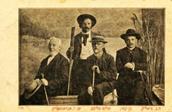In a 1966 lecture entitled “No Religion is an Island” Rabbi Abraham Joshua Heschel outlined four dimensions of religious existence to his audience at Union Theological Seminary—a liberal Protestant school. I reviewed it as part of a study session dedicated to Heschel’s Yahrzeit, 18 Tevet, which takes place this year (2023) on Shabbat, December 30.
The first is Teaching, which provides guiding principles both for everyday life (“temporal”) and spiritual (“eternal”). He called this creed or doctrine.
The second is Faith, which he characterized as the “intimacy of religion” – an intensely personal and private experience of religious life. He calls this “the dimension of privacy.”
The third is Deed, the sacred act in the sanctuary, in society, or at home, which he refers to as ritual.
The fourth is Context, meaning the context in which the first three, creed, faith, and ritual, take place—in the community or within “the covenant, history, tradition.” This contextualization of the first three is the dimension of transcendence.
Other typologies of what religion “does” often have three dimensions such as “God, Torah and Israel” or “Believing, Behaving and Belonging.” Heschel’s four dimensions attempt to balance public teaching, private experience and faith, and public life, and takes place within the context of community, covenant, history, and tradition. It seems to me that Heschel is right to include intimate, private experience in the mix, emphasizing that the way this works is ultimately uniquely personal to each individual—even though it takes place as well within a broader context.
This was good advice for the audience at Union, and good advice for us today: commit to guiding principles and teachings; develop private faith, enact our principles and faith not only in the sanctuary but also in society and at home, and, through contextualization, find a sense of a life worth living, going beyond the humdrum of daily existence: the dimension of transcendence.
Abraham Joshua Heschel was a leading 20th century Jewish thinker whose writings and actions impacted Martin Luther King and the struggle for Civil Rights in America, the Vatican and Jewish-Christian relations, the Vietnam War and the struggle for Soviet Jewry. His writings transformed our understanding of the Sabbath in Judaism as well as the nature of prophecy and theology.
As I write this, I recall that Heschel did not have much to say about Islam (I published an article about that some years ago). He wrote The Sabbath before 1967; the results of the 6-Day War and in particular the reunification of Jerusalem and the renewed access to the Old City of Jerusalem left an imprint on his thinking. He wrote a little about this in his book on Israel; his colleague (and my teacher) Moshe Zucker helped him interpret Qur’anic quotes, but I think that Heschel was only beginning to think about the ramifications of 1967 for Jewish-Islamic relations, and for Jewish-Arab relations. He died, much too young, in 1972. Heschel was not only a compelling writer and thinker, but an activist in civil rights, opposition to the war in Vietnam, and opposition to antisemitism and its ramifications both in the Catholic Church and with other Christian movements. I have been pondering how applying Heschel’s thoughts both about the sacred, the community and the Land of Israel–and about civil rights and antisemitism might inspire us regarding how to address the ongoing war in Israel following Hamas’ monstrous attack on October 7 2023–and its ongoing attacks in Israel–and the necessary but deadly Israeli actions to prevent Hamas’ ability to conduct future attacks.
Seth Ward

